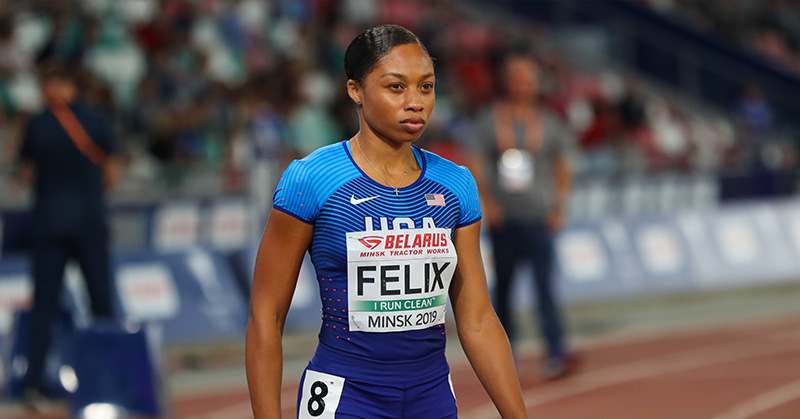A champion is defined as a person who has defeated all rivals in a competition. Allyson Felix fits this description threefold.
First, she won gold in her 12th World Championship relay race, beating out Usain Bolt for having the most gold medals. Two, she came out on top in a wage battle against Nike. Three, despite all odds, she accomplished both postpartum.
For women in sports, getting pregnant can be like signing a death warrant of their careers. Companies that supported them sometimes back out or pay them less than before, with the seeming implication that these women are ‘past their prime.’
Thirty-three-year-old Allyson Felix turned stereotypes on their head when she ran the mixed-gender 4×400 relay race at the World Championship and won gold a mere 10 months after birthing a premature baby via emergency cesarean section. Felix refused to give up the dream of becoming a mother and the dream of continuing to be a gold medal racer.
A Difficult Pregnancy
For most of her life, Felix concentrated on winning medals and scored the Olympic gold medal six times and was decorated as a world champion 11 times. At the age of 32, a new desire arose within her: to be a professional athlete and a mother.
Well into the pregnancy, Felix developed severe preeclampsia, a condition that brought on severely high blood pressure and many other risks for her and the unborn baby. The doctors had to birth the child quickly to keep both of them safe. On November 28, 2018 Camryn Felix was born at 32 weeks. She was three pounds and seven ounces, and had to spend the following 29 days in NICU. [1]
Somehow between the difficulties of a dangerous pregnancy and the sorrows of having an infant in intensive care, Felix got back to work training for the next competition and won gold.
Cutbacks from Nike
Felix, along with a group of other female athletes including Alysia Montano, Phoebe Wright, and Kara Goucher, fought Nike who wanted to decrease their sponsorship pay because of their pregnancy.
“Despite all my victories, Nike wanted to pay me 70 percent less than before. If that’s what they think I’m worth now, I accept that,” wrote Felix in a New York Times essay.
“What I’m not willing to accept is the enduring status quo around maternity. I asked Nike to contractually guarantee that I wouldn’t be punished if I didn’t perform at my best in the months surrounding childbirth. I wanted to set a new standard. If I, one of Nike’s most widely marketed athletes, couldn’t secure these protections, who could?” [2]
When Nike declined, Felix dropped their deal and signed with Athleta, the first athlete to ever do so. Not only had Nike lost a gold-medalist, but the company also received backlash over the issue. A month after Felix signed with Athleta, Nike changed its policy so that female athletes would not be “adversely impacted financially for pregnancy” for 18 months, six months longer than their previous policy.
They also responded to the athletes, stating, “Nike is proud to sponsor thousands of female athletes. As is common practice in our industry, our agreements do include performance-based payment reductions. Historically, a few female athletes had performance-based reductions applied. We recognized that there was inconsistency in our approach across different sports and in 2018 we standardized our approach across all sports so that no female athlete is penalized financially for pregnancy.” [3]
A Healthier Standard for Athletic Mothers
Felix’s race to gold 10 months after giving birth is an incredible feat, but she doesn’t think her time frame should become standard for other athletes. She stated that she “felt pressure to return to form as soon as possible,” which could have gone wrong after the complicated pregnancy and birth. [4]
Funnily enough, Nike’s female-empowering initiative called the Girl Effect drew Felix to their company in the first place. Felix was led to believe that by joining Nike, she could empower women. It’s heartbreaking that this belief was shattered by their treatment of her years later.
“This isn’t just about pregnancy,” wrote Felix. “We may stand behind the brands we endorse, but we also need to hold them accountable when they are marketing us to appeal to the next generation of athletes and consumers.”
Athletes are often told that their opinions don’t matter. They are ‘purely entertainers’and are told what to do and not mess up. For Felix and other aspiring mothers, pregnancy should not be considered “a mess up.” It should be accepted in their career as it is with other professions that provide proper maternity leave.
Finally, companies are finally obliging, from Burton, Altra, Nuun, Brooks, and now Nike. [2]
Champion, Olympian, Mother, Inspiration
Felix’s story is inspiring, to mothers, to athletes, to women, and to anyone who wants to make a change but is afraid to make a sound.
“I’ve always known that expressing myself could hurt my career,” wrote Felix. “I’ve tried not to show emotion, to anticipate what people expect from me and to do it. I don’t like to let people down. But you can’t change anything with silence.” [2]
- Heather Marcoux. Allyson Felix just broke Usain Bolt’s record at 10 months postpartum https://www.mother.ly/news/allyson-felix-just-broke-usain-bolts-record October 1, 2019
- Allyson Felix: My Own Nike Pregnancy Story https://www.nytimes.com/2019/05/22/opinion/allyson-felix-pregnancy-nike.html May 22, 2019
- Katie Kindelan. Female athletes slam Nike for allegedly penalizing them for being new moms https://www.goodmorningamerica.com/living/story/female-athletes-slam-nike-allegedly-penalizing-moms-63009877 May 13, 2019
- Annie Reneau. Allyson Felix just broke Usain Bolt’s record—a mere 10 months after giving birth https://www.upworthy.com/allyson-felix-just-broke-usain-bolts-record-a-mere-10-months-after-an-emergency-c-section October 1, 2019

